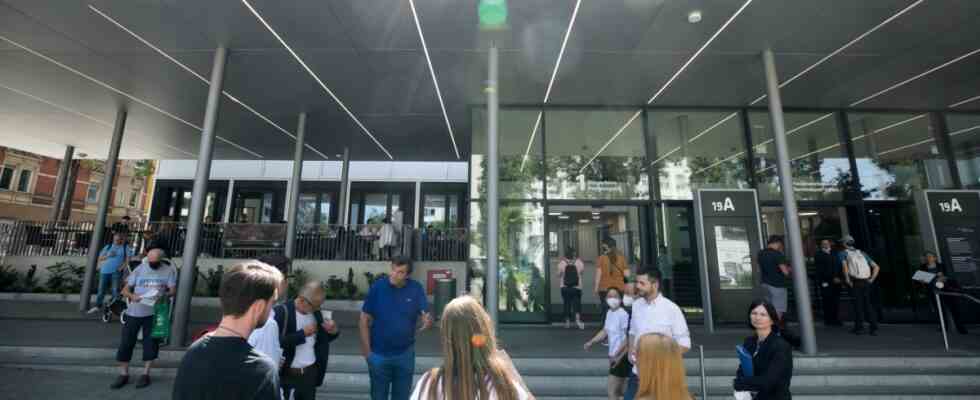Everything is new, everything is much more modern: this has been the case for the citizens’ office on Ruppertstrasse since January. The new rooms were opened there, and the other construction work in the district administration department (KVR) has now been completed for a few weeks. The work went on for five years: a fifth floor was added on top, the facade has been energetically renovated, the windows have been replaced, there is a lot of greenery around the building. The second phase of construction involved redesigning the office space and moving a total of 1,200 workstations during ongoing operations. All the measures related to improving citizen service cost 64 million euros. The renovation of the building was the responsibility of the owner.
Bright and clear: The newly designed citizens’ office in the KVR main building.
(Photo: Florian Peljak)
The “new face” of the KVR, that’s what Ulli Fabinski, project manager for the conversion, now calls entrance 19A, facing Lindwurmstrasse. In the past, you entered the authority and wandered through the corridors for a while. Today, citizens should know from the outside exactly where they need to go – information screens and a digital signage system show them the way.
There are now four separate entrances, some of which have been newly created, which allow for shorter routes in the building. When designing their workplaces, the employees could have contributed their own ideas and wishes, says Kristin Nettelnbrecher, who heads the Citizens’ Advice Offices department at the KVR. The working atmosphere has “improved significantly” since then, according to district administration officer Thomas Böhle. He believes that this satisfaction carries over to the customers. The waiting times are usually only a few minutes.
Clear visitor guidance – particular attention was paid to this during the reorganization.
(Photo: Florian Peljak/Florian Peljak)
The company has been running smoothly since it opened in January. This is also necessary, because this year the employees have processed more passport and ID matters than ever before: a good 142,000 were already there in 2022, in all Munich citizen offices combined. On the one hand, this is due to the fact that children’s passports have had to be renewed every year since the beginning of 2021, says Nettelnbrecher. On the other hand, it could be a consequence of the corona pandemic. According to the head of department, many would probably not have noticed during the two years that their ID card had expired. Now that people are traveling again, it is suddenly noticeable.
For KVR boss Thomas Böhle, 68, the tour of the new citizens’ office is also a farewell appointment. The SPD man, who has a doctorate in law, is retiring at the end of June after four decades in the Munich city administration. He is followed by the new KVR boss Hanna Sammüller-Gradl (Greens).
Looking forward to retirement: Thomas Böhle, who has headed the district administration department since 2016.
(Photo: Florian Peljak)
Böhle still remembers his early days at the head of the authority that decisively shapes the city’s social climate. That was in 2016, and “the first six months would have been enough for six years,” says Böhle. First the attack on and in the Olympia shopping center, a few days later a bomb attack in Ansbach. The events led to a completely new security concept in Munich, according to Böhle, “which had to be knitted with a hot needle”.
At the Oktoberfest that year, it was forbidden to take larger bags and backpacks with you. Meanwhile, 70 refugees went on a hunger strike at Sendlinger-Tor-Platz – the security authorities broke up the protest in November. After the attack on Breitscheidplatz in Berlin, security at Christmas markets also had to be reconsidered.
Later in Böhle’s tenure, there were sometimes neither Oktoberfest nor Christmas markets due to the corona pandemic. The challenges shifted, freedom of assembly became a “mega-topic”, as Böhle says. His authority was literally flooded with demo registrations; There were 1500 between April 2020 and today.
Even apart from the protests, dealing with public space, a typical KVR topic, was always present: during the lockdown and the associated restrictions for gastronomy and trade, but also when partying has shifted outdoors in recent summers. Since the spring, the war in Ukraine has also determined the work of the authority: 16,500 refugees have been registered there, and the employees have issued 10,000 residence permits.
Of course, there were also a few other topics between all the crises: the introduction of marriage for everyone, 13 elections and votes, the new sidewalk cafés, from which the city “will benefit for a long time to come,” according to Böhle. And now what’s next for him? He is reluctant to talk about private things, it said in an SZ portrait on the occasion of his election as KVR boss in 2016. Not much has changed about that. When asked about his plans, Böhle grins mischievously. “I’ll wake up and then decide whether to grab a book or go for a coffee.” That’s what he’s looking forward to: doing “what I feel like doing”.

